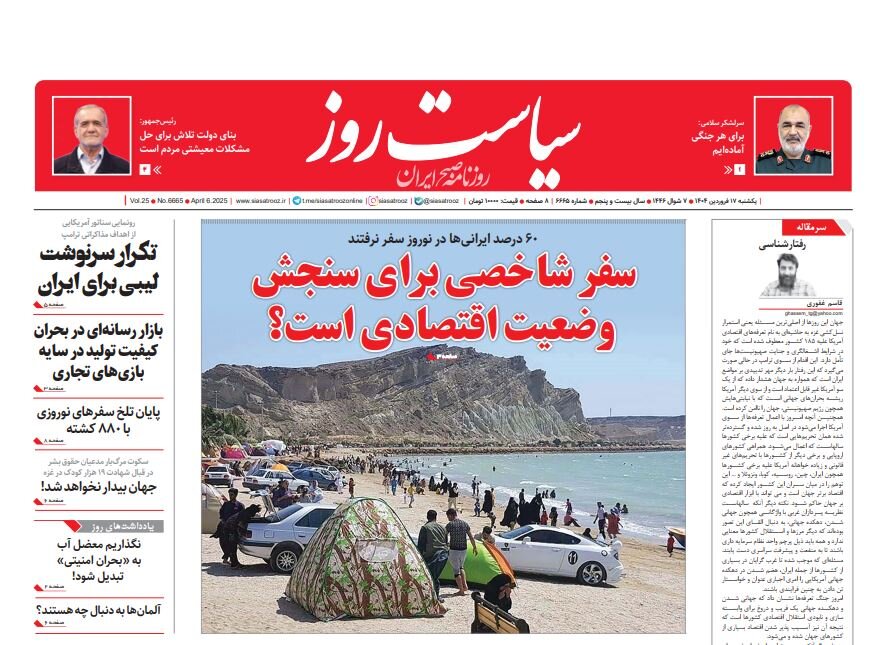Understanding America's behavior

TEHRAN - Siasat-e-Rooz dedicated its editorial to America's behavior, both with Iran and with the world.
It wrote: The behavior of the Americans shows that they do not adhere to any international commitments and regulations and simply violate them. Accordingly, discussions such as direct negotiations with the United States and an agreement with Trump, or joining institutions like the FATF, will not only fail to solve any problems but also lead to increased sanctions and pressure. On the one side, the U.S. Department of the Treasury has stated that it is seeking to close all banking and financial transactions with Iran, and on the other, the U.S. has stated that the goal of the negotiations with Iran is to end all nuclear activities in the country and turn the country into Libya, destroy its missile and drone capabilities, and its regional position. Today, the world has no other option to escape the current situation and confront America's economic “selfishness”. The only way forward is to de-dollarize, end cooperation with U.S. sanctions against other countries, and ultimately strengthen new blocs such as BRICS.
Shargh: Grossi's trip to Tehran and the equations between Iran and the IAEA
Shargh wrote an analysis about the incoming trip of Rafael Grossi, Director General of the International Atomic Energy Agency, to Tehran, which reads: The United States has revived the “maximum pressure” campaign against Iran and dealt a severe blow to diplomatic atmosphere. In these circumstances, Rafael Grossi's imminent trip to Tehran has once again brought to attention the tense relationship between Iran and the IAEA. This trip can be examined from two different analytical prospects: resolving differences with the IAEA as well as the looming shadow of Trump and the possibility of a clash. Tehran is in a complicated situation. On the one hand, it wants to maintain the path of interaction with the IAEA, and on the other, it is concerned that this path will serve as a platform for legitimizing new pressures. In short, Grossi's trip to Tehran could provide an opportunity to repair Iran's relations with the IAEA and Europe, but the extremely inflamed political atmosphere resulting from Trump's return to power has severely limited the possibility of making positive use of this trip. This is where technical interaction without active and intelligent diplomacy may add to existing complexities rather than untie the knots.
Sobh-e-No: Trump will set his country back if he enters war with Iran
In a note, Sobh-e-No argues that the United States’ Donald Trump will put his country behind rivals for many years if he enters a war with Iran. The paper said: Today, Iran is not considered a threat to America's national interests. However, the Islamic Republic is at the top of Washington’s foreign policy priorities, and it is spending heavily on military to confront Tehran. America's goal is to prevent Iran from going nuclear in the future. Since Iran is considered a model in combating arrogance and American hegemony, its approach may be replicated worldwide and make America more hated in the eyes of the world. If there is any rationality among American politicians, they will tame Trump. Trump seeks to maintain America's hegemony in the world, and if he enters an adventurous war with Iran, he will set his country back from its rivals for years.
Arman-e-Emrooz: Impact of possible talks on Iran’s economy
In a recent commentary, Arman-e-Emrooz discussed the potential impact of ongoing negotiations on Iran's economy. The country has faced significant challenges due to international sanctions and fluctuating exchange rates in recent years. Progress in nuclear negotiations could yield substantial positive effects for Iran's economy by reducing sanctions, boosting oil exports, enhancing international banking and financial relations, attracting foreign investment, curbing inflation, and ultimately improving the livelihoods of its citizens. The nuclear standoff between Iran and the United States remains a critical issue influencing the Iranian economy. Historical experience with the Joint Comprehensive Plan of Action (JCPOA) indicates that even the mere initiation of negotiations—whether direct or indirect—can create a positive psychological effect on markets and pave the way for greater economic stability. Conversely, a failure to reach an agreement or a shift toward military confrontation would likely have dire consequences for Iran's economy. Given the significance of this matter, it is anticipated that the Iranian government will seize diplomatic opportunities in the early months of the current year to alleviate economic pressures through a strategic approach. The outcomes of these diplomatic efforts will undoubtedly shape the trajectory of Iran's economy in the year ahead.
